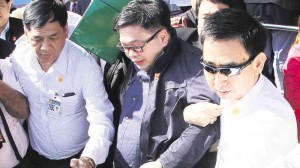MANILA, Philippines—The Department of Justice ordered the filing of criminal complaints Wednesday against former National Food Authority chair Angelito Banayo, businessman David Bangayan and several other rice traders and NFA executives in connection with the alleged smuggling of rice that the Senate investigated early this year.
Justice Secretary Leila de Lima approved the National Bureau of Investigation’s recommendation to file cases of violation of Section 3 (e) and 3 (j) of RA 3019, or the Anti-Graft and Corrupt Practices Act, against Banayo and special bids and awards committee chair Jose Cordero and members Celia Tan, Gilberto Lauengco, Carlito Co and Judy Carol Dansal.
De Lima also approved the NBI’s recommendation to file charges of bid fixing, a violation of Section 65 (b) 2, (b) 4 and (c) 1, (c) 2 and (c) 3 of Republic Act No. 9184 or the Government Procurement Reform Act, against rice traders David Bangayan (a.k.a. David Tan), David and Judilyn Lim, Elizabeth Faustino, Eleanor Rodriguez and Leah Echeveria.
The traders were also recommended to be charged with violations of Article 186 of the Revised Penal Code, which punishes monopolies and restraint of trade.
Bangayan was additionally recommended charged with violations of Article 178 of the RPC and Commonwealth Act No. 142, as amended by RA 6085, for using a fictitious name and concealing his true name.
NBI director Virgilio Mendez, in his 45-page report to De Lima, said that due to “still insufficient” evidence, “further investigation” was needed to determine if Bangayan could be held liable for rice smuggling.
“Further probe is recommended to establish the fact of smuggling, which necessitates securing from the Bureau of Customs documents evidencing entry of imported rice using the 2012 import permits issued by the NFA. These may include the name of the customs brokerage, bills of lading, cargo manifests, sworn statements of the customs broker used, the NFA inspection reports on the imported rice, and other relevant documents,” Mendez said.
De Lima instructed the NBI to “fast-track” the probe and the gathering of additional evidence.
The charges stem from the NBI’s verification of a scheme by which certain rice traders and importers were able to corner the NFA’s rice import allocations through the use of farmers’ cooperatives and farmers’ organizations (FCs/FOs) as well as single proprietorships as dummies.
“These rice traders/importers pooled the bidders into groups and financed their individual bids for NFA rice import allocation. In exchange, the bidders were given a small percentage share of a certain amount per sack of rice awarded to them. This scheme, in turn, allowed these rice traders/importers to corner the rice import allocations that were put up for bidding buy the NFA, even if they were not license by the NFA to engage in rice importation or trading,” the NBI said in its report dated July 30.
The NBI anti-graft division gathered bid documents, such as financial statements and income tax returns submitted by the farmer organizations and single proprietorships—one group headed by Tan and Faustino, and another led by Echeveria, the Lims and Rodriguez—which participated in the NFA’s private sector-financed rice importation mechanism.
“A review of said documents showed that the maximum annual gross income of the individual FCs/FOs did not exceed P200,000 while they individually made bids for a minimum of P15 million and a maximum of P60 million for NFA rice import allocations. On the other hand, the single proprietorships all had a uniform average gross income of P150,000 while they each made bids for a minimum of P60 million and a P70 million for NFA rice import allocations.,” the report stated.
The NBI said the farmer organizations and single proprietorships should not have been allowed by the NFA bidding committee to participate in the bidding and being awarded the rice allocations since they had insufficient capitalization, logistical resources and income to support multimillion peso bids, as shown in their financial statements and income tax returns.
The traders, on the other hand, allegedly manipulated the bidding process to corner the supply of imported rice in the local market.
“Hence, they engaged in, or made transactions prejudicial to lawful commerce, restrained free competition in the market, and altered or manipulated the market price of rice, which is a commodity of prime necessity, in the Philippines,” the NBI said.
The NBI claimed Banayo and the SBAC gave the unqualified bidders “unwarranted advantage or preference in the NFA bidding through manifest partiality, evident bad faith or gross inexcusable negligence.”
The NBI also asked the Bureau of Internal Revenue and the Anti-Money Laundering Council to investigate the traders and their firms for business malpractices and other “suspicious” transactions.
The report concluded that Bangayan was not licensed by the NFA as a rice retailer, wholesaler, or importer. Therefore, he could not have engaged in any business involving rice trading or importation.
This finding was the basis of the NBI’s decision to further investigate alleged illegal rice importation or rice smuggling that may have been undertaken by Bangayan, whether or not through the use of NFA awardees as dummies.
The further investigation was aimed at gathering and completing the necessary BOC documents to prove the crime of smuggling as penalized under the Tariff and Customs Code.
Three Senate committees had recommended the investigation following reports of alleged smuggling of rice from India and Vietnam, particularly at the Subic Bay Freeport Zone, Legazpi City port and other ports last year.
RELATED STORIES
NBI recommends ‘bid-fixing’ complaint vsBangayan


